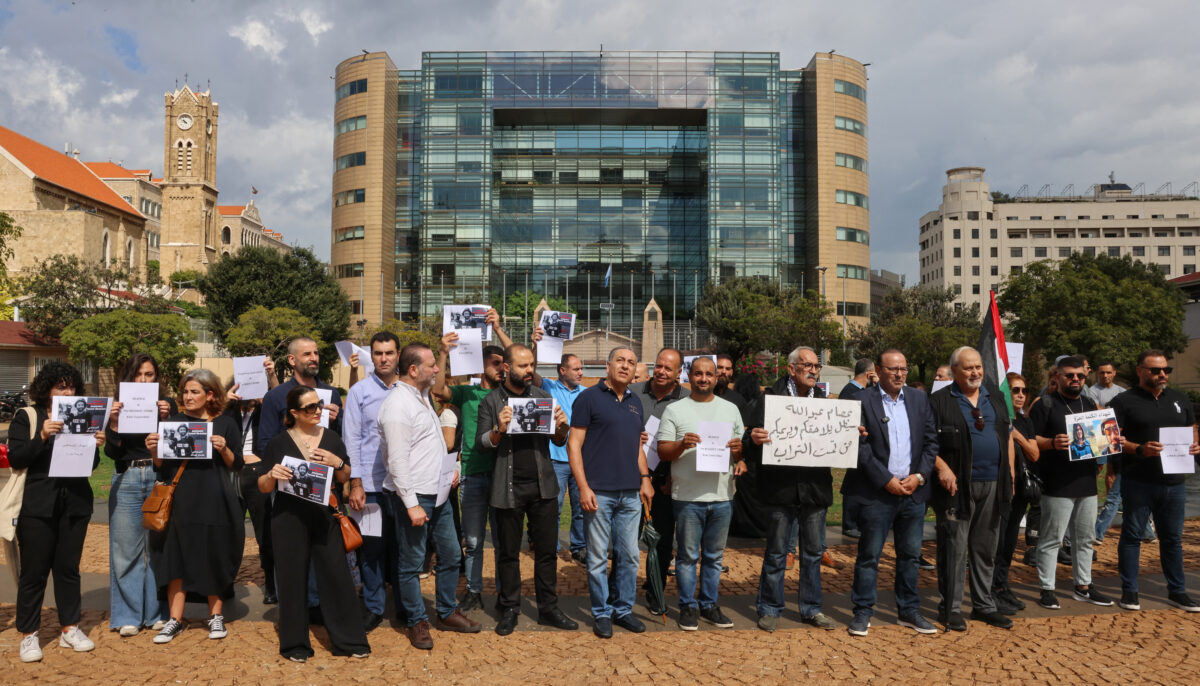Controversial, daunting, and disconcerting for journalists: this is the essence of the proposed media law in Lebanon under consideration in parliamentary committees. Thirteen years after the initial draft formulated by the Maharat Foundation—a non-governmental organization dedicated to matters of freedom of opinion and expression—alongside MP Ghassan Moukheiber, the law looks bad for journalism in Lebanon.
The legislation has traversed through various parliamentary committees and garnered the attention of successive information ministers. Notably, last year UNESCO introduced recommendations in collaboration with the current Minister of Information, Ziad Makary. The alternative press syndicate “Nakaba Badila” offered insights into the most recent draft put forth by the Administration and Justice Committee in 2021.
Despite these developments, the Lebanese Parliament’s Administration and Justice Committee is insisting on examining the outdated version of the proposed law, with minimal amendments suggested solely by its members. Representative George Adwan, the committee’s Chairman, rebuffed requests from civil society to attend closed sessions and contribute to the draft legislation.
Addressing this situation, the “Freedom of Opinion and Expression Coalition in Lebanon” (FoE) released a statement on Tuesday, November 28, asserting: “The Administration and Justice Committee in the Lebanese Parliament is on the verge of concluding its closed-door discussions on a new media law. If approved, the legislation, in its current state, is perceived as a significant constraint on freedom of expression and the press in Lebanon, thereby eroding fundamental human rights guarantees.”
Reviewing the most recent draft, the Coalition members identified “numerous concerning provisions that pose a threat to freedom of expression and the press.” They appealed to the House of Representatives, urging transparency in legislative discussions within parliamentary committees.
They advocated for openness and inviting civil society to contribute insights and recommendations to the draft. The Coalition emphasized the importance of aligning the new media law with international standards and called for the removal of criminal penalties in the current version.
See here: Nakaba Badila’s Notes on the Draft Law
On November 14, the Parliament’s Administration and Justice Committee continued examining the new law, considering input from the Ministry of Information. Previously, a sub-committee was tasked with studying the law and presenting its findings to the Committee. The Ministry of Information subsequently provided its observations on the sub-committee’s report.
In a single session, devoid of substantial discussion, the Committee swiftly approved over thirty articles of the distorted version of the media law proposal, disregarding proposed amendments from UNESCO, which were forwarded to the Parliament by the Minister of Information. This occurred amid the notable absence of representatives from journalists and relevant human rights organizations during committee meetings or discussions. Additionally, there was an attempt to exclude journalists working in websites from the process.
The Committee’s focus remained on the outdated version of the law, neglecting the observations put forth by UNESCO on the draft media law. This discrepancy prompted a fiery public exchange of press statements between the Committee and human rights and media organizations in Lebanon.
Advocating for Journalists’ Protection, Not Incarceration!
Journalist Elsie Mufarrej, coordinator of Nakaba Badila, conveyed in an interview with SMEX that the current version of the law is highly unfavorable. She emphasized that it “re-emerged amidst the wave of reforms urged by international donors in response to the economic crisis and the Beirut Port explosion.”
Mufarrej listed the perils posed by the media law, pinpointing the foremost concern as the “examination of the proposal within the context of an environment antagonistic to freedoms in Lebanon, particularly the freedom of journalistic work. This is exacerbated by ongoing prosecutions against journalists, as the prevailing stance within parliamentary committees tends to curtail freedoms and endorse provisions facilitating the imprisonment of journalists; provisions that had been expunged from the Penal Code prior to the civil war.”
Regarding alternatives to articles criminalizing journalists, Mufarrej advocates for creating a non-exceptional civil court specializing in media law with three trial levels: primary, appeal, and cassation. She contends that no penalties or criminal record rulings should be imposed on journalists.
The media law in question extends its authority over journalists, barring them from publishing minutes of meetings involving entities like the Council of Ministers and the Supreme Judicial Council. This is perceived as a violation of the right to access information and present it to the public, as highlighted by lawyer Tony Mikhael, a legal advisor at the Maharat Foundation.
In addition to the imperative of abolishing trials for activities falling within the purview of freedom of opinion and expression protected by the Constitution, Mikhael explains to SMEX that the law should “guarantee protection for journalists and their rights. This includes safeguarding their profession by ensuring the protection of sources, shielding their homes from arbitrary judicial inspections, and securing their equipment from unwarranted interference.”
Empowering Editors and Press Syndicates
In its current iteration, the media law assigns a role to the “National Press Council,” inclusive of the Press and Editors Syndicates, to oversee television and radio media outlets licensed for terrestrial waves and frequencies based on agreed-upon terms and conditions. The National Press Council is endowed with procedural authority, empowering it to hold media outlets accountable following a warning, providing an opportunity for defense commensurate with the violation.
Media professionals are concerned about the potential role and powers granted to editors and press syndicates under the “Lebanese Press Union.” This concern is fueled by less-than-encouraging experiences with regulatory bodies and syndicates, as highlighted by Mufarrej.
“Many journalists are not affiliated with the syndicate body; most operate as freelancers without adequate protection from either syndicates or employers. Furthermore, they face judicial prosecutions, and the law does not recognize them as journalists due to their non-membership in the Editors’ Syndicate, which poses significant barriers to entry,” she added.
Navigating the Fate of Websites
The version of the law under consideration by the Administration and Justice Committee mandates the acquisition of prior licenses for media, a departure from the original version proposed by MP Ghassan Moukheiber and the “Maharat Foundation.” In their proposal, the prerequisite for a prior license was confined to institutions using frequencies, excluding those operating solely on the internet.
The media law proposal put forth by “Maharat” and Representative Moukheiber advocates for the regulation of electronic media with the freedom to establish websites without prior approval. However, the Committee’s version, subjected to amendments since 2010, has distorted the law’s original content, according to Mikhael.
The ongoing amendments considered by the Parliamentary Administration and Justice Committee necessitate the registration of professional websites through a specific registry with the “National Council for Audiovisual Media.” Mikhael contends that this falls “outside its powers.”
The media law’s current version contains a comprehensive definition of electronic media and electronic newsletters, but the categorization of websites subject to registration and the high fees imposed for their establishment have raised a number of issues. Article 45 in the Administration and Justice Committee’s version sets the fees for media websites at 150 million Lebanese pounds (equivalent to 100,000 US dollars at the previous exchange rate of 1,500 pounds per dollar).
The FoE Coalition contends in its statement that compelling websites to pay exorbitant establishment fees “would stifle freedom of expression in the country.” In contrast, the UNESCO version proposed a more flexible approach by not specifying fees in the law. Instead, it suggested entrusting this responsibility to the “Media Regulatory Authority,” an entity with financial and administrative independence dedicated to regulating the media sector.
Nakaba Badila posits that this approach could offer broader independence, but it advocates for the adoption of self-regulation for the media, citing past experiences where appointing regulatory bodies failed to ensure independence.
Rouba Al-Helou, a university professor specializing in communication and gender issues, told SMEX that the recent concept of media self-regulation circulating among Lebanese media outlets lacks a unified definition. Instead, it is shaped by its application within the context of the country’s culture, legal environment, and media systems, operating within a voluntary democratic framework.
Al-Helou, who has facilitated several meetings aiming to regulate the media in Lebanon based on the experiences of Sweden and Denmark, elaborates that media institutions within newsrooms commit to upholding fundamental professional standards. These standards encompass accuracy, fairness, dedication to implementing the public interest, professionalism, acknowledgment of errors, and transparency in presenting information. These professional rules serve as a clear charter for work, policies, and their implementation.
Amidst journalists facing risks, including fatalities while covering front lines and encountering legal challenges such as defamation lawsuits, coupled with difficulties in joining their professional syndicate, the Lebanese Parliament’s Administration and Justice Committee persists in pushing for a punitive version of the new media law, overlooking both international and local proposals.



